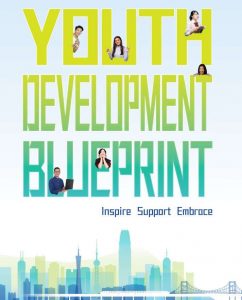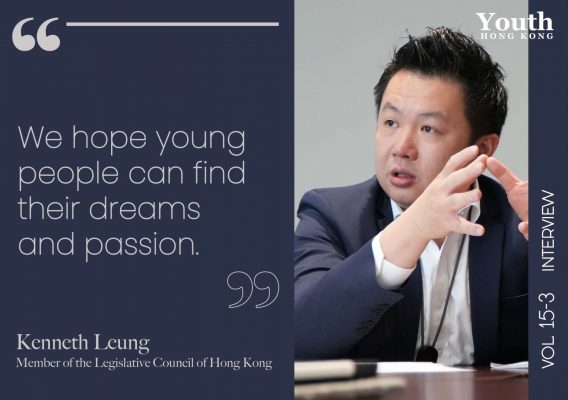The Path Forward: An Interview with Kenneth Leung on Hong Kong Youth and Post-Pandemic Challenges
//vol.15-3 Interview
The Path Forward:
An Interview with Kenneth Leung on Hong Kong Youth and Post-Pandemic Challenges
For three years, Covid brought the world to a standstill. During these trying times, young people as well as youth service workers in Hong Kong have been trying their hardest to adjust themselves to the new norm when the city was isolated.
More challenges arise as the time comes to restart youth work. In a conversation with Youth Hong Kong, Kenneth Leung, JP, Member of the Legislative Council of Hong Kong, shared his insights about the future of youth work and strategies to confront the challenges ahead.
As youth services return to a so-called “new normal”, Kenneth notes that service providers and participants of youth work must adapt to a new unfamiliarity after a three-year gap of conventional service provision. Many who worked in youth services left their positions during the long wait, while newcomers stepped into an unknown environment without guidance. Additionally, young people found their own future aspirations unclear without the guidance and recommendations of peers.
One of the key areas where this gap is particularly evident is in the lack of cultural exchange programmes between Hong Kong and the Mainland, resulting in a lack of first-hand information. “We always talk about restarting, but it’s not as easy as we thought it would be. It takes time and so far we have only seen some small-scale reboots,” says Kenneth.
The border between Hong Kong and Mainland China remained closed for nearly three years between early 2020 and January 2023, separating families and disrupting tourism and other businesses. Hong Kong residents, including Legislative Council members and government officials, were unable to see first-hand developments on the Mainland and had to rely on news media for the latest trends.
As a simple and jovial example, he points to how the game of frisbee had become extremely popular in the Mainland, but this was unknown to people in Hong Kong. As the border reopens, there is a critical need for both sides to re-familiarise themselves with one another, and to ensure that this knowledge is also incorporated into youth work.
However, Kenneth highlights the need to increase upward mobility and fully understand the needs and concerns of young people both in Hong Kong and Mainland China. While not negating the importance of a national identity and housing issues, Kenneth stresses the importance of increasing upward mobility, which plays a crucial role in addressing other problems.
In his opinion, Hong Kong is a place where traditional key industries like finance, tourism, and the service sector dominate. A social environment like this has limited young people’s opportunities for diverse career paths and upward mobility.
However, Kenneth was clear in emphasising that upward mobility is not only about climbing the corporate ladder, but instead to create more paths to various new lifestyles and emerging industries. Through this, he says, “We hope that young people can successfully find their own dream and passion and set a goal, whether in education, employment, entrepreneurship, or property ownership.”
Another area that needs focus is supporting youth career development and creating a more favourable social environment. Hong Kong is striving to become a hub in eight key areas, including cultural exchange and intellectual property trading as outlined in the 14th Five-Year Plan.
The Youth Development Blueprint, which Kenneth worked on in 2022, also aims to support diversified career development in other emerging industries. The blueprint, which lays out the plans and hopes of youth citizens, serves as an indicator for the government to improve on youth work. However, it has also identified several long-term challenges, such as Hong Kong’s ageing and decreasing population. Issues such as attracting talent, promoting the welfare of youth, and increasing youth’s upward mobility will become focuses not only for the community as a whole, but also for youth service organisations to address.
Re-emphasising the demographic shifts and the impact it has had on the economy, Kenneth is fully aware of the challenges ahead. This year, he has shifted his focus to the government’s population policy, proposing measures such as offering housing subsidies for families with children, providing support for childcare and day-care services, and offering greater flexibility for working parents.
Kenneth also suggests that the government and NGOs could consider more efficient resource allocation and workflow improvements.
According to Kenneth, the government should actively mobilise and integrate resources, such as collaborating more frequently with NGOs ,schools, universities and faculty members in internship programmes. It is also extremely important to consider how to effectively utilise existing resources in conjunction with the blueprint.
“We’ve invested substantial resources in assisting marginalised groups and offered a wide range of programmes through organisations like The Hong Kong Federation of Youth Groups. However, we’ve yet to see significant results.”
Looking into the future, Kenneth hopes to incorporate support for marginalised groups into his youth work. “By allocating resources in a better way, we want to make sure that we are not marginalising anyone in society. They should think about how to provide them with opportunities to learn and grow,” says Kenneth.
 Kenneth Leung
Kenneth Leung
Currently a Member of the Legislative Council of the Hong Kong Special Administrative Region and Vice-Chairman of the Youth Development Commission, Kenneth also holds public positions in the Mainland and Hong Kong. In recognition of his contribution towards youth development work, he was awarded the Chief Executive’s Commendation for Community Service in 2017, and appointed as a Justice of the Peace in 2020. Dedicated to youth development work, his portfolio includes strengthening Hong Kong youth’s sense of national identity, and promoting the exchange of youth between the Mainland and Hong Kong. ■



